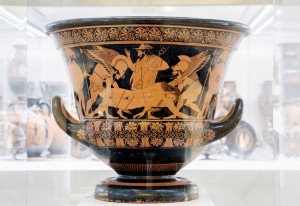For a few years now, Turkey has been trying increasingly hard to make life awkward for countries & institutions holding disputed Turkish artefacts. Undeterred by this (or perhaps brimming with bullish over-confidence that Turkey will capitulate), New York’s Metropolitan Museum is attempting to organise a Seljuk exhibition without any loans from Turkey. No actual loan requests have been refused as such, but preliminary discussions indicated that cooperation from Turkey would not be forthcoming, meaning that the Met decided against asking for any loans.
The Seljuks were the Turkish dynasty that existed prior to the Ottomans. as such, Turkey holds by far the largest collection of artefacts from the period. Organising an exhibition without these is significantly harder than it would otherwise have needed to be.
Greece on the other hand has always made a point of continuing to cooperate with Britain over other matters, while maintaining their stance on the Parthenon Sculptures. This is despite many opportunities to block loans for exhibitions, or to not issue permits for British archaeologists etc. Whilst this spirit of cooperation, of not connecting what are in reality disparate items is admirable, I can’t help feeling sometimes that Britain needs to be made to feel a bit less comfortable about their position. The British museum does not deal with the Parthenon Marbles issue in a serious way, because it doesn’t feel that it has to. It has kept up this approach for many years now & everything else continues to happen as normal.

Socrates in discussion with his pupils, Seljuk manuscript from 13thcentury, Istanbul, Topkapi Palace Library
From:
Art Newspaper
No Turkish loans for big Seljuk Turk show planned by the Met
Thorny early discussions with Ankara deterred the US museum but Turkish attitude now appears more conciliatory
By Tim Cornwell. Museums, Issue 261, October 2014
Published online: 09 October 2014
The Metropolitan Museum of Art in New York is organising a major exhibition on the Seljuks, whose medieval Islamic empire expanded from central Asia into much of modern Anatolia in Turkey, without loans from Turkey, The Art Newspaper has learned. Experts fear that loans from any collections in Iran or Russia will also be missing in the Met’s show.
The Met’s problem securing Turkish loans echoes those surrounding the British Museum’s exhibition on the Hajj, which went ahead in London in 2012 without Turkish artefacts after tangled disputes over an inscribed stele with a relief of Herakles, which have yet to be resolved.
Read the rest of this entry »



